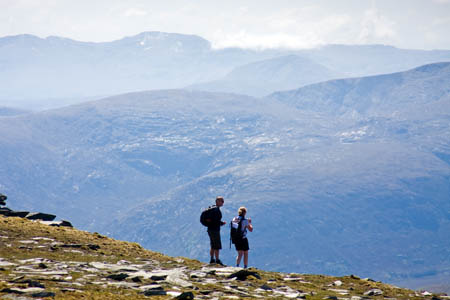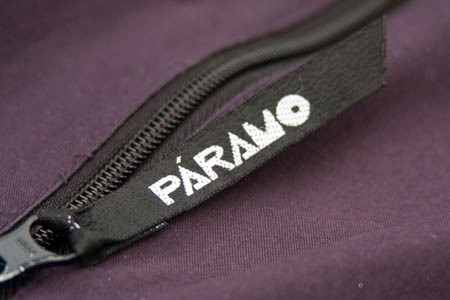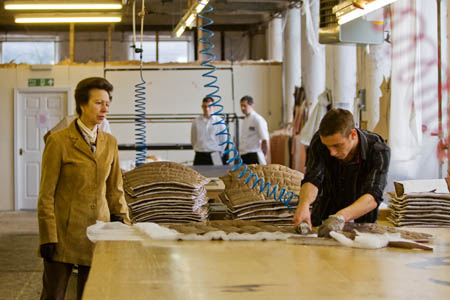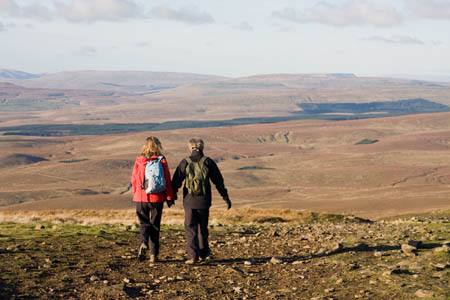
Companies are 'happy enough to use a mountain in catalogues'
Outdoor gear manufacturers stand accused of showing a disregard for the environmental impact of their businesses in a groundbreaking survey.
Ethical Consumer magazine says that, despite having a healthy and wholesome image the outdoor gear industry is in reality heavily dependent upon oil-based chemicals for the production of everything from tents to walking jackets, the production of which results in highly polluting toxic waste.
The authors say in their outdoor gear special buyers’ guide they surveyed more than 60 companies and found ‘virtually all the companies pay little regard for environmental issues with most having woefully inadequate environmental and ethical reporting policies’.
The 16-page report features some of the best know brands in the outdoor market. Tim Hunt of Ethical Consumer and co-author of the buyers’ guide said: “It’s the ultimate irony that whilst outdoor gear companies depend upon a pristine environment for their profitability the vast majority show a total disregard for the environmental impact of their businesses.”
Yet it appears environmental concerns come low on most buyers’ list of priorities. Co-author Simon Birch admits that, in a recent survey in a leading hillwalking magazine, the issue barely registers on most people’s radar when buying new gear – a surprising and disappointing finding, he says.

Ethically sound footwear may not be up to the job of hillwalking in the Highlands
He also admits the pay-off for buying ethically sound products can be lack of performance. The top scoring vegan boots, for instance, simply aren’t up to the demands of many hillwalkers. The report says: “Sure, they’re perfect if you’re bumbling along a country lane but when it comes to more demanding terrain then they’re just not up it. When I tested them out in the rigours of the Scottish Highlands the upper part of the boots were way too flexible and gave my ankles minimal support. The result was that I had a very long and very careful decent down a particularly steep mountainside to make sure that I didn’t go over on my ankles. Not good. The path to sustainability is indeed a long and tricky trail.”
Ethical Consumer uses its ‘Ethiscore’ criteria to evaluate fleeces, waterproof jackets, boots, tents, sleeping bags and rucksacks. These criteria are themselves open to debate. For instance, the fact an outdoor manufacturer supplies military users will lower its score. This is important in an industry that produces many products that are used in extreme conditions that armed forces may encounter.
The rights of workers producing the gear is also a factor in how highly they score. Bryony Moore, another of the guide’s authors, said: “Whilst high street fashion brands have rightly come under the ethical spotlight recently the outdoor gear industry has escaped this scrutiny.
“The result is that with most companies having no policies in place to protect workers’ rights, questions must remain over the ethical credentials of the companies we surveyed.”

Páramo, with its factory run by a charitable foundation, scored highly in the ethics table
Páramo, which produces 80 per cent its clothing in the Bogotá factory run by the Miquelina Foundation, scores highest in the fleeces and waterproof jackets categories; the boots ethical table is, not surprisingly, headed by Vegetarian Shoes and Ethical Wares, notwithstanding the performance caveat mentioned above. Zamberlan is next in line – a more conventional manufacturer.
Snugpak, with its West Yorkshire factory putting together many of its products, comes out tops in the sleeping bags category, despite its strong military following.
Hilleberg and Lightwave are top dogs in the tent table and Osprey is the most ethical rucksack brand.

The Princess Royal visited Snugpak's Silsden factory last year to present the Queen’s Award for Enterprise
Issues such as use of recycled materials are now being taken up by the industry though, interestingly, ArcTeryx, the upmarket Canadian brand, eschews their use, saying such manufacture leads to more energy consumption and that their performance does not measure up.
And, in a sign that the ethical question may be about to become more important, seven brands, Patagonia, The North Face, Vaude, Helly Hansen, Haglöfs, REI and Deuter, are working towards gaining the Bluesign eco label, though many of the most familiar outdoor brands seem to be lagging behind.
Simon Birch, one of the report’s authors, says: “In trying to explain this lack of environmental awareness, some suggest that since the outdoor industry regularly uses the sweeping backdrop of dramatic mountains to help market and advertise their gear, the public assumes that the industry is by default environmentally responsible.
“Sadly, as this buyers’ guide shows, this is far from the truth. Plus, let’s not forget that it’s outdoor companies who are now increasingly acting like the fashion industry in being hell bent on flogging us ever increasing amounts of outdoor gear.
“Whilst some in the outdoor industry are at long last starting to talk about sustainability, few understand the basic contradiction between aiming to produce more sustainable gear and a profit-driven business model that relies on selling more and more.
“So what’s to be done? Some believe that it’s up to customers to wise-up and start piling the pressure on the outdoor industry to clean up its act.

Consumers 'shouldn't bear responsibility'
“Well, I don’t buy this as I’m getting increasingly fed up with the current trend of dumping the responsibility for raising the environmental bar on to consumers. From where I’m standing it’s the outdoor industry that needs to start taking its environmental responsibilities more seriously. If a company is happy enough to use a mountain in its latest catalogue to help boost its profits, then it’s about time that the same company started to help protect it – and the rest of the environment too.”
But Louise Ramsay of the Outdoors Industries Association, which represents many gear manufacturers and retailers in Britain, points out not all of the companies listed actively participated in the survey.
However, she said: “The report touches on important issues and highlights some of the challenges that every business faces.
“The outdoor industry is very well aware of its environmental and ethical responsibilities, which must be balanced with a responsibility for ensuring product performance and safety for the end user.
“The industry is already working in a very collaborative fashion to address these issues with long term sustainability in mind. A vast majority of those companies mentioned in the report, several of which are OIA members, are actively involved in this work.
“The Outdoor Industries Association’s membership represents all parts of the outdoor sector. Along with other existing and planned initiatives, the OIA’s ongoing sponsorship of the Innovations for Extremes conference is central to our commitment to the sustainable, ethical development of the UK’s outdoor industry. We also continue to play a role in the sustainability projects being undertaken by the European Outdoor Group.”
The full report, including Ethical Consumer’s views on new innovations such as nanotechnology, the problems of merino sheep flystrike, live feather plucking and other less obvious considerations for the walker and climber buying gear, is available in PDF form online. It’s a useful update on an issue grough first looked at in March 2007 and which could well become a more pressing matter for a buying public that spends its leisure time in pristine environment and wilderness areas.
andyr
14 June 2010The main issue for the consumer should be to buy gear that is robust and will last. I do buy walking gear to replace stuff that wears out, not usually because it is this seasons must have item. A few ounces extra weight per item is no great issue for me.
I do own three pairs of boots, two pairs were second user and therefore should be counted once against the impact on the environment, one is a winter pair only for crampon use. Whilst the uppers are good, I will resole as necessary.
Rucksacs, tents and outer layers can be good for five or more years with attention to drying out and reproofing.
Outdoor gear is a niche market compared to fashion and I suspect that hillwalking and trekking is a smallish niche in outdoors. The bulk of specialised delicate fabrics is probably in the cycling, running, performance sport activities. This is not an excuse for our favorite activity not to get flak or ignore the effects of manufacture on everyone else.